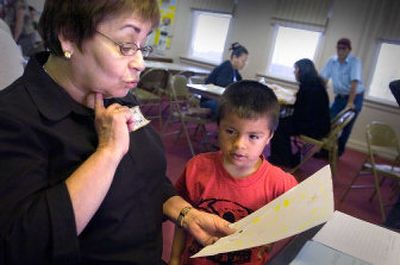They’re coming to become Americans

They just want to belong – to vote, to acquire new rights, to become official members of the country they now consider home.
“I love America, I love Spokane,” said Abel Pavon Morales, a refugee from Cuba. “I want to be part of this country. I want to be a U.S. citizen.”
On Saturday, the 62-year-old took the first step toward citizenship by seeking assistance from attorneys, interpreters and other volunteers at Naturalization Day 2006, a daylong event at St. Joseph Catholic Church designed to help people become U.S. citizens.
He and at least two dozen other immigrants spent several hours at the church’s parish center, filling out the lengthy application from the U.S. Bureau of Citizenship and Immigration Services while getting advice on how to prepare for interviews and the U.S. history and government exam that they must pass in order to be naturalized.
“A U.S. citizen has more rights (than those with just permanent resident status),” said Morales, who fled to the U. S. six years ago. “I want to vote and to exercise those rights.”
Spokane was one of nine locations throughout the state where immigrants received help Saturday. Many who came to St. Joseph were originally from Mexico or Latin America, but the event also drew people from Germany, Canada and other countries.
“A lot of people are eligible for citizenship, but many don’t apply because they’re too intimidated,” explained Andrea Crumpler, an attorney with the Northwest Immigrant Rights Project, one of several organizations that sponsored Naturalization Day. “Some are just too afraid to do it on their own.”
To allay their fears and to better explain the naturalization process, volunteers who spoke Spanish and other languages spent at least an hour with each applicant – translating the 10-page application line by line, making photocopies of required documents, even providing envelopes and directions to the nearest post office.
“It makes me happy to help them achieve their goal,” said Ivone Guillen, a Gonzaga University freshman who translated for many of the Spanish speakers.
Immigrants seeking citizenship to this country but are not married to a U.S. citizen must live here for at least five years, know English and pass a civics exam, as well as take the oath of allegiance to the United States during a ceremony. Those who are married to and living with a U.S. citizen can apply after only three years.
Applicants must pay a $330 fee plus another $70 for fingerprints. They also must be of “good moral character,” so anyone who has committed murder, rape, sexual abuse of a child, drug trafficking and other aggravated felonies is automatically barred from naturalization.
In 2004, more than 537,000 people nationwide became U.S. citizens, according to the Washington chapter of the American Immigration Lawyers Association. Of that total, 12,667 lived in Washington state.
Bertha Rocha, 57, left Durango, Mexico, for America in 1978 but has yet to become a citizen. Language has been her biggest barrier – limited English skills have caused her to fail the written test twice. She knew most of the answers, she said, but couldn’t always translate them well enough to pass.
Morales – who left behind five daughters in Cuba to escape persecution for his political beliefs – is also working hard to improve his English skills and knowledge of U.S. history. He recently signed up for English as a Second Language classes, he said. He’s also watching videos and has been practicing with friends.
It’s been more than eight years since Rocha last applied for citizenship, said her son, Hector Rocha. After many months of intense study with her sister and her daughter-in-law, the entire family drove all the way from Wenatchee on Saturday to fill out applications.
“I’ve been waiting for the day when I can become a citizen,” Bertha Rocha said in Spanish. “This place has been my home for more than 25 years.”